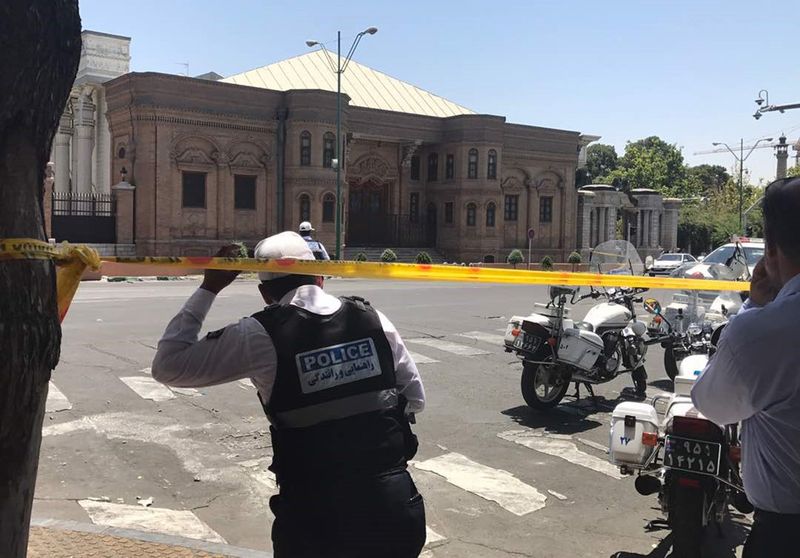-
At least 12 dead, 40 hurt at parliament and Khomeini monument
-
Attack comes amid escalating tensions over Qatar, Syria

Police take security measures at the scene.
Photographer: Fatemeh Bahrami/Anadolu Agency/Getty ImagesIran vowed to take revenge for Islamic State attacks in its capital on Wednesday and hinted that it may hold Saudi Arabia responsible, risking an escalation of the feud that’s divided the oil-rich Gulf region into increasingly hostile camps.
Islamic State said it carried out the suicide-bomb and gun attacks that killed at least 12 people at Iran’s parliament and the shrine of the Ayatollah Ruhollah Khomeini, a site of political and religious importance for Iran’s Shiite Muslim population. The Iranian Revolutionary Guard Corps promised retribution for the “innocent blood spilled” in the first such strike by the jihadists in Iran. And, the Guards said, Iranians won’t fail to note that the violence came soon after U.S. President Donald Trump met with “leaders of a reactionary government in the region which supports terrorists” -- an apparent reference to the Saudis.
The contest between Iran and Saudi Arabia, the region’s main Sunni power, has helped fuel wars in Syria and Yemen. It spread to the heart of the Gulf this week as the Saudis led a drive to isolate Qatar, blaming their neighbor for ties with Iran and militant groups, and closing its land border. Trump, who endorsed the Saudi pressure while other U.S. officials appealed for calm, visited the kingdom last month and joined King Salman in calling for a united front against Iran and jihadism.
“Today’s attack adds to cross-Gulf tensions that already had been elevated by the Trump trip -- in which anti-Iranism was a principal theme -- and by the Iran angle in the actions taken against Qatar,” said Paul Pillar, a professor at Georgetown University in Washington and former CIA officer.
Saudi and Iranian leaders blame each other for sponsoring militant groups. The Saudis point to Iranian support for Hezbollah and Hamas, while Iran says Saudi preachers and financial support aided the rise of al-Qaeda and Islamic State.
Those accusations, made over the years, will resonate among Iranians after Wednesday’s violence, said Amir Handjani, a non-resident fellow at the Atlantic Council based in Dubai.
“Rightly or wrongly, the perception inside Iran is going to be that Saudi Arabia is behind the attack,” said Handjani. He referred to comments last month by Saudi Deputy Crown Prince Mohammed bin Salman, who accused Tehran of wanting to “control the Muslim world” and said the conflict should happen “inside Iran, not in Saudi Arabia.”
Iranians will likely “view this as an attempt to test and weaken Iran, to show that they are vulnerable inside their borders,” Handjani said.
Trump said in an emailed statement that “we grieve and pray for the innocent victims of the terrorist attacks in Iran,” but added that “states that sponsor terrorism risk falling victim to the evil they promote.” Saudi Arabia’s Foreign Minister Adel al-Jubeir said the kingdom condemns such attacks “wherever they take place.”
More than 40 people were also injured in the Tehran attacks. The Revolutionary Guards, whose vow of revenge was reported by the Tasnim news agency, were deployed to bring down the assailants.
Iranian security forces and allied militias are fighting against Islamic State in Iraq and Syria, where they’ve played a key role in propping up President Bashar al-Assad against Saudi-backed rebels. The U.S. and its local allies are carrying out their own separate campaign against the jihadists in Syria, and clashed with Iranian forces last month.
Meanwhile, Iran has condemned the Saudi-orchestrated campaign against Qatar. It offered to help the country by re-routing flights that have been shut out of Saudi and U.A.E. airspace, and shipping food that can no longer be imported via the land border.
Iran’s Supreme Leader Ayatollah Ali Khamenei played down the impact of Wednesday’s attacks, saying in an audio file posted on his website that some “firecrackers” won’t “impact the resolve of the population and the determination of officials.” President Hassan Rouhani said that national unity will help overcome any plot by “ill-wishers.”
‘Daily Life’
The four attackers at the parliament in Tehran went in via the public entrance, wearing women’s clothes, and a firefight with security forces broke out immediately, according to Tasnim. Hours later, the Intelligence Ministry said a suicide bomb went off. Amid the chaos, lawmakers continued the day’s scheduled debate about the mining industry.
On the outskirts of the city, gunmen entered the Khomeini shrine and opened fire before an explosion hit the site, Tasnim said. Images of the blast were shown on Press TV, which said one assailant was shot dead before he could detonate a bomb, but another succeeded.
Tehran is less accustomed to such incidents than many Western capitals. State broadcasters said it was the first such attack there for at least 20 years.
“I’d been hearing in the news for some time about insecurity all over the world,” said Pedram, a 34-year-old musician who declined to give his surname. “Syria, London, Kabul, Paris, Manchester. I was really affected by it. But today, the feeling came into my personal, daily life.”
©2017 Bloomberg L.P. All Rights Reserved. To subscribe or visit go to: www.bloomberg.com